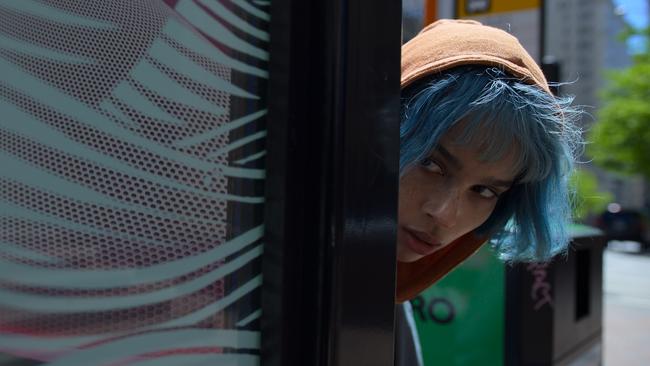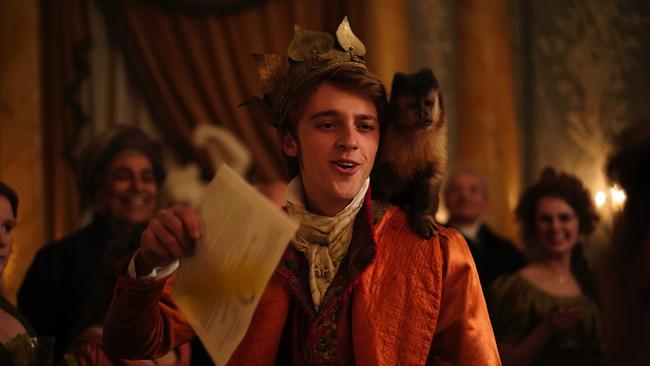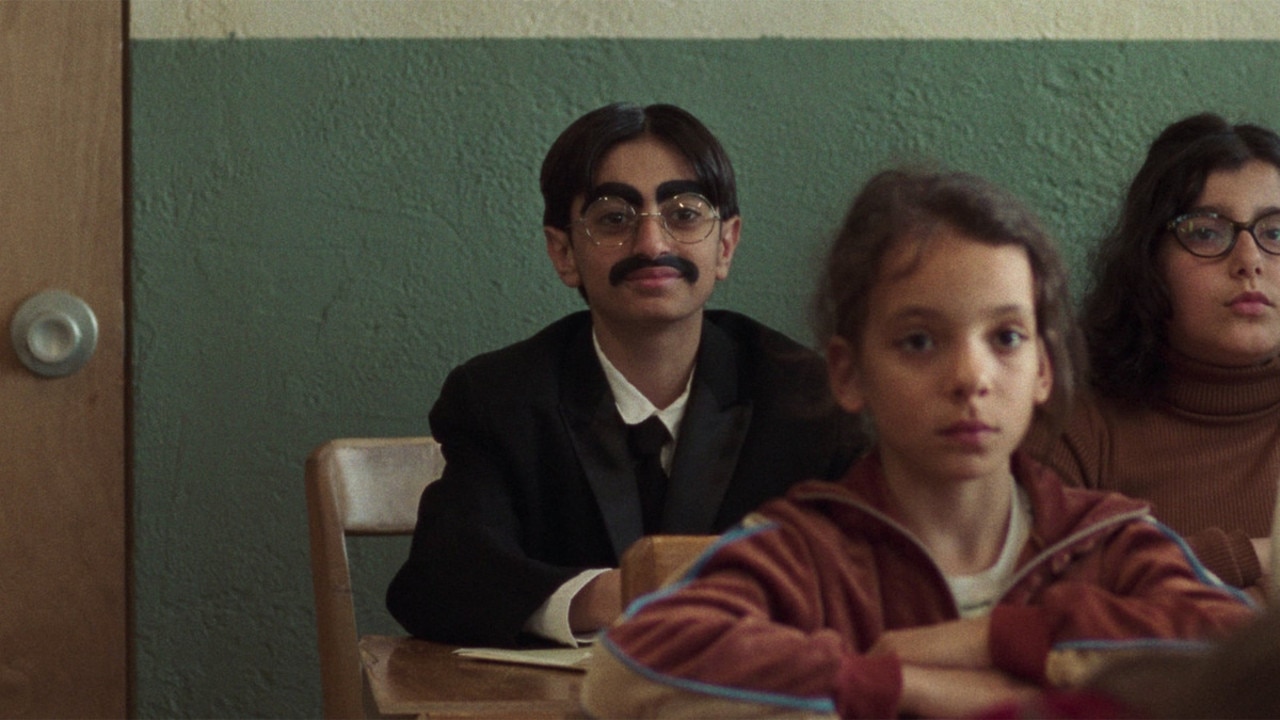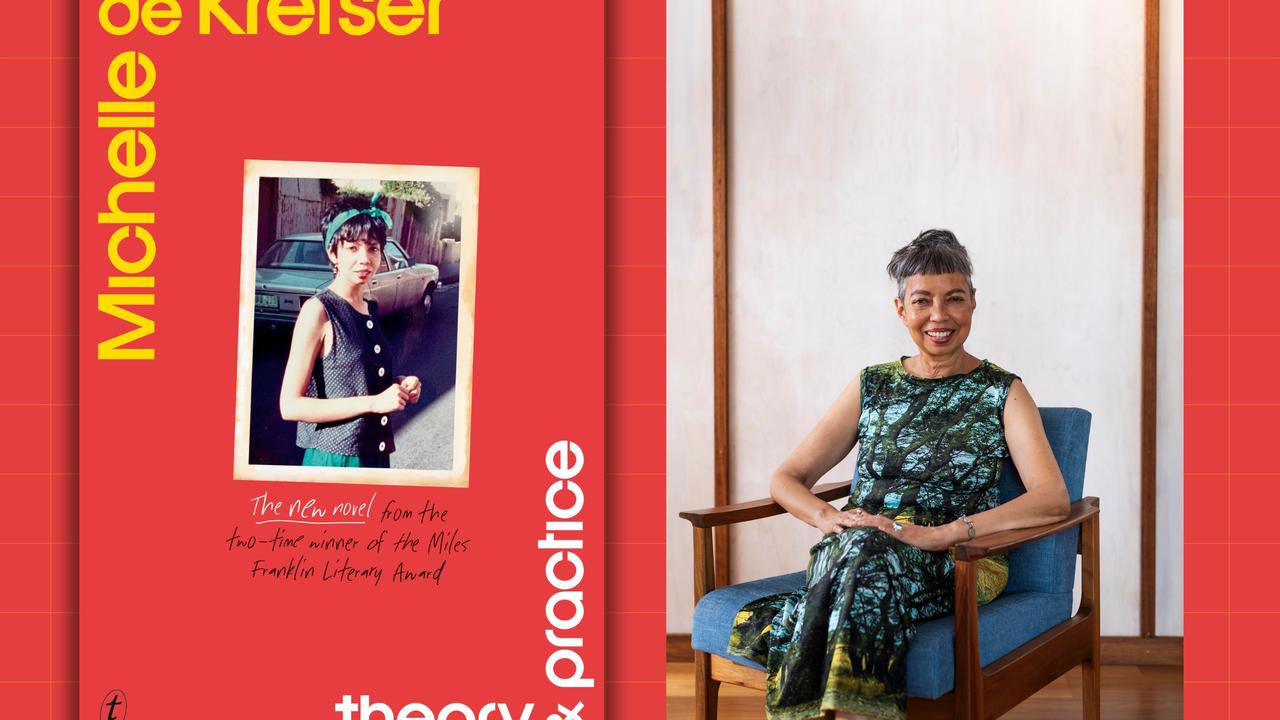Zoe Kravitz excellent in KIMI
Kravitz’s character is obsessive and pops a lot of pills. Whether she can trust herself to defy her tech giant employer to save someone she thinks is at risk is at the heart of this movie.

KIMI (M)
Foxtel
★★★½
Your life, simplified.
So reads a billboard advertisement for KIMI, a voice-controlled virtual assistant akin to Siri and Alexa. In Steven Soderbergh’s nerve-jangling Covid-cyber-corporate thriller KIMI, however, life is anything but simple.
Angela Childs (Zoe Kravitz) is a Seattle-based tech analyst for Amygdala, the private firm behind KIMI, which is planning to list on the stock market and make its bosses rich.
Her job is to monitor the conversations between KIMI users and KIMI and correct any misunderstandings or infelicities.
When KIMI does not compute “You’re a pecker wood … a big wooden dick”, for example, Angela fixes this “unresolved stream” by updating KIMI’s database of vulgarisms.
Amygdala (named, in a neat ironic joke, after the emotional part of our brain), boasts that they have people, not algorithms, working to connect humans and artificial intelligence.
Angela has not left her spacious industrial loft for a long time, and not only because of the pandemic. She is agoraphobic.
There’s a lawyer neighbour (Byron Bowers) who comes by for casual hook-ups. Everyone else – her mother, her friends, her colleagues, her psychiatrist – she sees only via FaceTime calls.
There’s light relief in the virtual connection with a Romanian tech guru named Darius (Alex Dobrenko). He calls her “hotness” and before she can complain points out that “In Romania, MeToo is 50 years away.”
At the same time, there’s a slightly creepy-looking man in another apartment who seems to watch her with binoculars.
Angela’s over-commitment to the age of isolation is tested when she hears a stream and thinks it is a man being violent to a woman.
She does not know who the woman is but thinks she is in a life-threatening situation.
“I know bad,” she says. “I used to moderate for Facebook.” She takes it to someone higher up the corporate food chain and he tells her to delete the stream. “Our policy is that it’s none of our business.”
This adds to the suspicion that all is not above board with the people behind KIMI.
Angela must decide whether to stay put or go into the outside world and help someone she thinks is at risk.
Of course, she may be mistaken. She is obsessive, paranoid and pops a lot of pills. We learn of a trauma in her past and her subsequent mental health leave.
This slick, 89-minute movie can be seen as a 21st century update of three classics: Alfred Hitchcock’s Rear Window (1954), Michelangelo Antonioni’s Blow-Up (1966) and Francis Ford Coppola’s The Conversation (1973). Did they hear/see/record/photograph what they think they did?
Kravitz, thin as a waif and with a blue-bob, commands every moment she is on screen. She carries this movie with great precision. We will next see her as Catwoman in Matt Reeves’s much-anticipated The Batman, which hits cinemas next week.
The script is by David Koepp, a big fish at the box office via blockbuster franchises such as Jurassic World, Mission Impossible, Indiana Jones and Spider-Man.
However, Soderbergh reportedly was hooked by one of his smaller budget films, Panic Room (2002), directed by David Fincher. Like that movie, KIMI is tense, taut and claustrophobic.
The cinematography is by the director, under his regular pseudonym Peter Andrews, and it is inventive and perceptive when it comes to the pros and cons of the digital revolution.
As is his habit, the director keeps us guessing. At the outset, we wonder if this is another movie about AI gone wrong. We know the answer by the end and it is surprising.
This is the eighth film Soderbergh has released since announcing his retirement in 2013. He also directed terrific TV series The Knick, set in a New York hospital in the early 1900s, starring Clive Owen. We can only hope his retirement continues.
-
Lost Illusions
In cinemas from March 1
★★★★
“Money was the new royalty and no one wanted to chop its head off.”
So says the occasional narrator in the glorious French film Lost Illusions, a darkly funny, world-as-it-ever-was drama that is as relevant now as when first published as a novel close to 200 years ago.
Fake news? Just as Al Gore didn’t invent the internet, fake news was not invented by Donald Trump. Indeed the 45th president would struggle to be an apprentice on the upstart Parisian newspapers of the early-to-mid-1800s.
As that no-guillotine opening line suggests, the setting of this film is Restoration France. The main character, Lucien Chardon (Benjamin Voisin), lives in the southwestern province Angouleme. He is 20 and almost impossibly handsome. He wants to be a poet but as poetry – then as now – doesn’t pay the bills he works as a printer.
When a local arts patron, the minor aristocrat Louise de Bargeton (Cecile de France), takes him under her wing, a die is cast. She is older but such discrepancies are relative. Her husband is “almost as old as her chateau”.
They fall for each other and race off to Paris.
Lucien uses his mother’s surname, de Rubempre, which has tenuous links to the aristocracy. Whether their autumn-summer relationship works out is for viewers to find out, but it is in Paris that this movie feels like 2022.
Lucien meets another aspiring writer, Raoul Nathan (Xavier Dolan), who introduces him to Dauriat, a grocer turned publisher who cannot read or write (a marvellous Gerard Depardieu).
“Poetry. No one reads that you fool,’’ declares the man who hasn’t read a book, and his balance sheet agrees with him.
Lucien then falls in with a journalist, Etienne Lousteau (Vincent Lacoste), who works for liberal newspapers, which are considered scandal sheets by the aristocracy and the royalist government.
And the blue bloods are not far wrong. Lucien quickly learns that every story is paid for. A good or bad review of any work of art is based solely on who pays the most. Dauriat pays a lot; sometimes to laud his authors, sometimes to ridicule them. Controversy sells is his business plan.
It’s the same on the stage, where the puppeteer of thumbs up or down is Singali (Jean-Franc Stevenin) and his team of paid clappers and booers. “He has the Italian hissers in tonight,’’ someone warns. “It’ll be a massacre.”
Lucien uses his writing skills to pen savage reviews or, when the price is right, exuberant ones. “To write a review, best not read the book,’’ Etienne advises. “You may be influenced.”
This advice comes to mind later when the editor has to decide which book to review: the one by Chateaubriand or the one by Stendahl. He lets the office pet – a monkey – make the selection.
Lucien becomes someone people are afraid of, and therefore interested in. He meets a young, attractive boulevard theatre actress, Coralie (Salome Dewaeli), who aspires to the higher stage. All the while, Mme de Bargeton hovers in the background.
This is all splendidly done, not least because it skirts so close to the truth. This film, directed and co-written by Xavier Giannoli, is sumptuously shot, superbly acted and has a nonstop, whip-smart dialogue that, in English, might have been written by Aaron Sorkin.
The wordsmith behind it all is a touch older: Honore de Balzac (1799-1843). This is an adaptation of his serialised (between 1837-1843) novel Illusions Perdues, which became part of his multi-volume masterpiece La Comedie Humaine.
That title fits Balzac perfectly. A writer who injected realism into French literature, he explored the glories, braveries, absurdities and mockeries of the human condition. He lived them, too. There are similarities between his life and Lucien’s.
Lost Illusions, which runs for 149 minutes, is the opening film of the French Film Festival, which runs in all states in March and April. Session details at www.affrenchfilmfestival.org
Post-festival its cinema run will continue through Palace Cinemas.





To join the conversation, please log in. Don't have an account? Register
Join the conversation, you are commenting as Logout